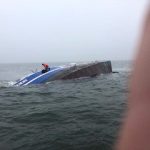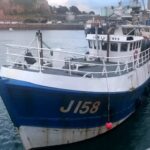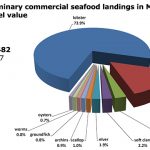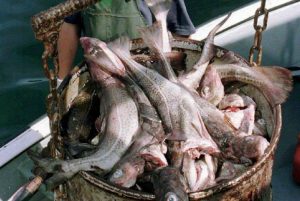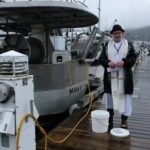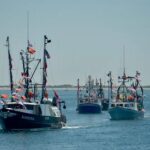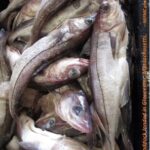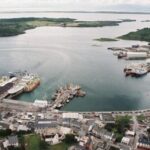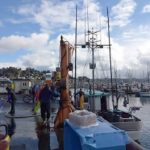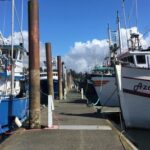Monthly Archives: December 2014
DEADLIEST CATCH: 7 Things We Hope to See (or Not) in 2015!
 Last season on Discovery Channel’s hit series, DEADLIEST CATCH, there were a lot of storylines to follow. We Hope to See: Jake Harris Battle His Demons and Win: Older Harris brother Josh took the Cornelia Marie out fishing, but younger brother Jake stayed home, still fighting his personal battles. We Hope NOT to See: Mandy Hansen. Speaking of greenhorns, we really would rather not revisit Mandy on the Northwestern this season. Read the rest here 13:19
Last season on Discovery Channel’s hit series, DEADLIEST CATCH, there were a lot of storylines to follow. We Hope to See: Jake Harris Battle His Demons and Win: Older Harris brother Josh took the Cornelia Marie out fishing, but younger brother Jake stayed home, still fighting his personal battles. We Hope NOT to See: Mandy Hansen. Speaking of greenhorns, we really would rather not revisit Mandy on the Northwestern this season. Read the rest here 13:19
North Pacific Fishery Management Council members seek halibut bycatch cut
 After a motion failed at the North Pacific Fishery Management Council by a single vote with an Alaska delegate absent, another effort is underway to reduce halibut bycatch in the Bering Sea in the face of rapidly sinking catch limits for the directed fisheries. Interim Alaska Department of Fish and Game Commissioner Sam Cotten and the other five Alaska members of the North Pacific council signed a letter to National Marine Fisheries Service Assistant Administrator Eileen Sobeck on Dec. 18 asking for an emergency reduction in . Read the rest here 12:44
After a motion failed at the North Pacific Fishery Management Council by a single vote with an Alaska delegate absent, another effort is underway to reduce halibut bycatch in the Bering Sea in the face of rapidly sinking catch limits for the directed fisheries. Interim Alaska Department of Fish and Game Commissioner Sam Cotten and the other five Alaska members of the North Pacific council signed a letter to National Marine Fisheries Service Assistant Administrator Eileen Sobeck on Dec. 18 asking for an emergency reduction in . Read the rest here 12:44
Rhode Island Fishermen’s Alliance Weekly Update, December 28, 2014
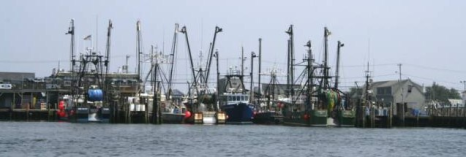 The Rhode Island Fishermen’s Alliance is dedicated to its mission of continuing to help create sustainable fisheries without putting licensed fishermen out of business.” Read the update here To read all the updates, click here 11:13
The Rhode Island Fishermen’s Alliance is dedicated to its mission of continuing to help create sustainable fisheries without putting licensed fishermen out of business.” Read the update here To read all the updates, click here 11:13
York, Maine – Residents alarmed as Coast Guard changes foghorns
 For Tom Bradbury and his neighbors, the town foghorn is more than just a familiar, wistful noise — it represents something greater, like peace itself. “There’s a sense that someone is on guard, watching over those who are on the water,” Bradbury said. “We find it a very pleasing, comforting sound.” That’s why Bradbury, of Kennebunkport, and hundreds of New Englanders are sounding the alarm over a Coast Guard plan to convert old-style foghorns to newer technology. Read the rest here 10:26
For Tom Bradbury and his neighbors, the town foghorn is more than just a familiar, wistful noise — it represents something greater, like peace itself. “There’s a sense that someone is on guard, watching over those who are on the water,” Bradbury said. “We find it a very pleasing, comforting sound.” That’s why Bradbury, of Kennebunkport, and hundreds of New Englanders are sounding the alarm over a Coast Guard plan to convert old-style foghorns to newer technology. Read the rest here 10:26
We can’t save Kenai kings by destroying Cook Inlet setnetters
 A few weeks ago, I went into town to shop for groceries. As I walked into the market, a man with a clipboard asked me, “Would you like to protect salmon?” Maybe I’m biased. No, I’m definitely biased by that experience. It’s not fair that a limitless number of fishing guides, who only have to take a five-day course to qualify to go into business, try to take away the ability of setnetters to fish. Setnetters spend thousands of dollars to get a permit and thousands more to buy gear. Are the guides going to reimburse the setnetters for their permits? Read the rest here 10:09
A few weeks ago, I went into town to shop for groceries. As I walked into the market, a man with a clipboard asked me, “Would you like to protect salmon?” Maybe I’m biased. No, I’m definitely biased by that experience. It’s not fair that a limitless number of fishing guides, who only have to take a five-day course to qualify to go into business, try to take away the ability of setnetters to fish. Setnetters spend thousands of dollars to get a permit and thousands more to buy gear. Are the guides going to reimburse the setnetters for their permits? Read the rest here 10:09
Florida lobsters find a market in China
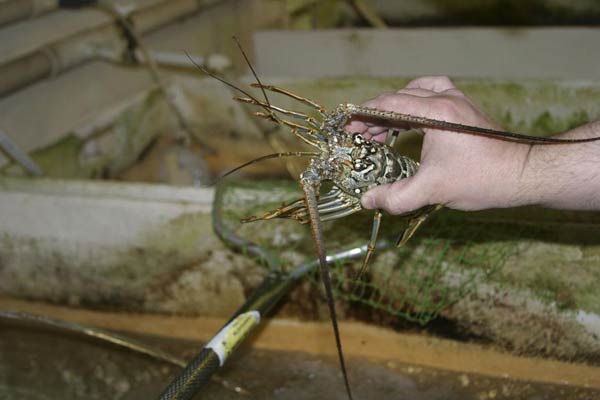 The US lobster trade with China is growing rapidly, especially for a species called the spiny lobster that is harvested in the Florida Keys. “The Chinese prefer the spiny lobster over its better known brethren the North American or Maine lobster. Part of the reason is cultural – the Chinese think of a spiny lobster as similar to a dragon prawn and the dragon is a very powerful symbol in China.” Read the rest here 21:56
The US lobster trade with China is growing rapidly, especially for a species called the spiny lobster that is harvested in the Florida Keys. “The Chinese prefer the spiny lobster over its better known brethren the North American or Maine lobster. Part of the reason is cultural – the Chinese think of a spiny lobster as similar to a dragon prawn and the dragon is a very powerful symbol in China.” Read the rest here 21:56
Coast Guard Responds to Fishing Vessel in distress off South Carolina coast
 The Coast Guard responded to a vessel taking on water Saturday, 48 miles southeast of Folly Beach, South Carolina. No injuries were reported, and the vessel did not sink. Watchstanders in the Coast Guard Sector Charleston command center received a report of the situation at 4:10 a.m., from the captain of the 37-foot commercial fishing vessel. Read the rest here 17:26
The Coast Guard responded to a vessel taking on water Saturday, 48 miles southeast of Folly Beach, South Carolina. No injuries were reported, and the vessel did not sink. Watchstanders in the Coast Guard Sector Charleston command center received a report of the situation at 4:10 a.m., from the captain of the 37-foot commercial fishing vessel. Read the rest here 17:26
Mass starfish stranding reported on Fripp Island
 The stranding of thousands of starfish on Fripp Island was likely due to Wednesday’s stormy weather, according to a marine veterinarian. George Sedberry, a science coordinator in national Office of Marine Sanctuaries, said he has not studied this stranding but offered other possible explanations for the sea stars’ deaths. (You know where this is going, right?) Read the rest here 13:31
The stranding of thousands of starfish on Fripp Island was likely due to Wednesday’s stormy weather, according to a marine veterinarian. George Sedberry, a science coordinator in national Office of Marine Sanctuaries, said he has not studied this stranding but offered other possible explanations for the sea stars’ deaths. (You know where this is going, right?) Read the rest here 13:31
Dead mullet troubles in Anna Maria Island
 “Fisher folk have been harvesting mullet this way for many generations. They have a recognized right to a way of life and a livelihood from the sea,” he said. “But we want to work with them to see if we can find a way to better use the bycatch for food or for fertilizer or for purposes other than the cast-offs and the nonsensical practices that we are seeing. “We’re seeing unacceptable conditions along the shores of Anna Maria,” he added. Read the rest here 11:07
“Fisher folk have been harvesting mullet this way for many generations. They have a recognized right to a way of life and a livelihood from the sea,” he said. “But we want to work with them to see if we can find a way to better use the bycatch for food or for fertilizer or for purposes other than the cast-offs and the nonsensical practices that we are seeing. “We’re seeing unacceptable conditions along the shores of Anna Maria,” he added. Read the rest here 11:07
Managing Forage Fish: New limits hope to protect game fish
Earlier this month, the 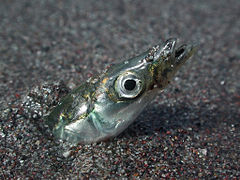 , at least for now, prohibited the development of new fisheries and expansion of existing ones for unregulated forage fish throughout the region from 3 miles off the beach to 300 miles out in the ocean. The action is like a moratorium designed to give regulators time to learn more about the science of how these little fish fit into the ecosystem. Read the rest here
, at least for now, prohibited the development of new fisheries and expansion of existing ones for unregulated forage fish throughout the region from 3 miles off the beach to 300 miles out in the ocean. The action is like a moratorium designed to give regulators time to learn more about the science of how these little fish fit into the ecosystem. Read the rest here
The Bernstein family and Island Trust Agreement Development redevelopment prompts concerns for commercial fishing there
 One of Stock Island’s largest landowners intends to keep commercial fishing part of a plan to redevelop a large portion of Safe Harbor, the owners said. The lack of details about the development have led to speculation and uneasiness among fishermen. The Bernstein family and the owners of Fishbusterz fish market want to ease those fears. Read the rest here 10:24
One of Stock Island’s largest landowners intends to keep commercial fishing part of a plan to redevelop a large portion of Safe Harbor, the owners said. The lack of details about the development have led to speculation and uneasiness among fishermen. The Bernstein family and the owners of Fishbusterz fish market want to ease those fears. Read the rest here 10:24
New England: Fishing regs have widespread impact
 In mid-December, Les Eastman sent out one of his fishing charter party boat full of tourists who were in the region to fish in New Hampshire’s ocean waters.,, For decades, the increasingly restrictive fishing regulations handed down by Washington, D.C. bureaucrats were primarily a burden to small boat commercial fishermen in the inshore fleets found along coastal New Hampshire, Maine, and parts of Massachusetts. Read the rest here 09:53
In mid-December, Les Eastman sent out one of his fishing charter party boat full of tourists who were in the region to fish in New Hampshire’s ocean waters.,, For decades, the increasingly restrictive fishing regulations handed down by Washington, D.C. bureaucrats were primarily a burden to small boat commercial fishermen in the inshore fleets found along coastal New Hampshire, Maine, and parts of Massachusetts. Read the rest here 09:53
FFAW says Shrimp Quota Cuts Having Noticeable Impact on Communities
 The FFAW admits the average person may not fully understand the impact cuts to shrimp quota could have on rural parts of the province. This year the inshore took a 27 per cent cut while the offshore only saw a three per cent quota reduction. Audio, Listen here 09:34
The FFAW admits the average person may not fully understand the impact cuts to shrimp quota could have on rural parts of the province. This year the inshore took a 27 per cent cut while the offshore only saw a three per cent quota reduction. Audio, Listen here 09:34
Oceana “Bering Sea 2014 canyon cruise” turns up fewer corals, more controversy
 A conservation group scientist, John Warrenchuk, of Oceana, said it could indicate the corals were wiped out by commercial net fishing, while a fishing industry scientist said they may never have grown there in the first place, and said existing records would show if any fishing had ever happened in the coral-free areas. Industry scientist John Gauvin, representing bottom trawlers, called for a review of data of fishing activity by area, based on data collected by observers onboard commercial fishing vessels. Read the rest here 09:12
A conservation group scientist, John Warrenchuk, of Oceana, said it could indicate the corals were wiped out by commercial net fishing, while a fishing industry scientist said they may never have grown there in the first place, and said existing records would show if any fishing had ever happened in the coral-free areas. Industry scientist John Gauvin, representing bottom trawlers, called for a review of data of fishing activity by area, based on data collected by observers onboard commercial fishing vessels. Read the rest here 09:12
Gloucester Mayor Carolyn Kirk resigning, taking state job
 Gloucester Mayor Carolyn Kirk is resigning as the city’s chief executive officer to assume the position of deputy secretary in the state’s Executive Office of Housing and Economic Development in the incoming administration of Governor-elect Charlie Baker. Read the rest here 08:40
Gloucester Mayor Carolyn Kirk is resigning as the city’s chief executive officer to assume the position of deputy secretary in the state’s Executive Office of Housing and Economic Development in the incoming administration of Governor-elect Charlie Baker. Read the rest here 08:40
Sea Shepherd Attempts to Legitimize! Commences Recovery of Illegal Gillnet
 Yesterday, December 25, at approximately 1326 AEDT, the Sea Shepherd conservation ship, Sam Simon, located a discarded gillnet at 62° 16’ South, 081° 14’ East, inside the Commission for the Conservation of Antarctic Marine Living Resources (CCAMLR) area of management. Using the coordinates and photographic evidence provided by fellow Sea Shepherd ship, the Bob Barker, Sam Simon Captain Sid Chakravarty was able to identify the gillnet – a method of fishing outlawed by CCAMLR since 2004 – as the property of the Interpol-listed vessel, Thunder. Read the rest here 07:57
Yesterday, December 25, at approximately 1326 AEDT, the Sea Shepherd conservation ship, Sam Simon, located a discarded gillnet at 62° 16’ South, 081° 14’ East, inside the Commission for the Conservation of Antarctic Marine Living Resources (CCAMLR) area of management. Using the coordinates and photographic evidence provided by fellow Sea Shepherd ship, the Bob Barker, Sam Simon Captain Sid Chakravarty was able to identify the gillnet – a method of fishing outlawed by CCAMLR since 2004 – as the property of the Interpol-listed vessel, Thunder. Read the rest here 07:57
No endangered listing for prized pinto abalone
 The National Marine Fisheries Service has declined to list a prized 6-inch Pacific Ocean marine snail as an endangered or threatened species. The mollusks need federal protection because their populations have plummeted from 80 to 99 percent in much of their range, according to the and the Center for Biological Diversity. “These are species that science shows ocean acidification and climate change are going to do it in,” he (Brad Sewell, a senior attorney for Natural Resources Defense Council) said. Shut up. Read the rest here 21:36
The National Marine Fisheries Service has declined to list a prized 6-inch Pacific Ocean marine snail as an endangered or threatened species. The mollusks need federal protection because their populations have plummeted from 80 to 99 percent in much of their range, according to the and the Center for Biological Diversity. “These are species that science shows ocean acidification and climate change are going to do it in,” he (Brad Sewell, a senior attorney for Natural Resources Defense Council) said. Shut up. Read the rest here 21:36
American Samoa tuna cannery gets $70 million from Bellevue company

A Washington state company is making a $70 million investment in a tuna cannery in the U.S. territory of American Samoa. The products from American Samoa will carry the “Made In USA” label, said officials with Bellevue-based Tri Marine International. The company took over the lease of a government property three years ago after another cannery closed. Tri Marine’s plant is expected to employ some 1,500 workers when fully operational and is operated by the company’s , which is in the seaside village of Atu’u. Read the rest here 20:17
Bering Sea/ Aleutian Islands Bycatch debate far from being finished – and other news
Bering Sea halibut fishermen narrowly missed getting a reduction of trawl bycatch at the latest  meeting after a tied vote on a petition for emergency action by the state of Alaska. At issue are the drastic cuts being made to the directed halibut fishery in the Bering Sea and the lack of similar cuts to the bycatch mortality by trawlers. That is not the end of it, however. Read the rest here 19:05
meeting after a tied vote on a petition for emergency action by the state of Alaska. At issue are the drastic cuts being made to the directed halibut fishery in the Bering Sea and the lack of similar cuts to the bycatch mortality by trawlers. That is not the end of it, however. Read the rest here 19:05
Cook Inlet fish wars dominate headlines again in 2014
 The Upper Cook Inlet fisheries were tense in 2014, with an emotional Board of Fisheries meeting in the winter and new restrictions in the summer. Alaska’s Board of Fisheries met in Anchorage in late January and early February to discuss management plans for Upper Cook Inlet. By the end of the two-week meeting, the board for the first time approved changes that paired restrictions for sport and commercial fishermen. Read the rest here 17:07
The Upper Cook Inlet fisheries were tense in 2014, with an emotional Board of Fisheries meeting in the winter and new restrictions in the summer. Alaska’s Board of Fisheries met in Anchorage in late January and early February to discuss management plans for Upper Cook Inlet. By the end of the two-week meeting, the board for the first time approved changes that paired restrictions for sport and commercial fishermen. Read the rest here 17:07
Sabine’s excuse for using modeled data over real data? – ‘earlier data is not of “sufficient quality.”‘
 WUWT reader Peter Gadiel writes: After reading of the critique of Sabine’s exclusion of the historical data on ocean acidification I emailed him. I thought his response might be of interest to you at WUWT. He says the earlier data is not of “sufficient quality.” My question to him: “As a taxpayer who is helping to pay your salary I’d like to know why you are refusing to include all the data on ocean acidification that is available.” For his response, Read the rest here 16:23
WUWT reader Peter Gadiel writes: After reading of the critique of Sabine’s exclusion of the historical data on ocean acidification I emailed him. I thought his response might be of interest to you at WUWT. He says the earlier data is not of “sufficient quality.” My question to him: “As a taxpayer who is helping to pay your salary I’d like to know why you are refusing to include all the data on ocean acidification that is available.” For his response, Read the rest here 16:23
An Opinion – How “Jaws” ruined everything for great white sharks
 Christopher Neff, a lecturer in public policy at the University of Sydney, has been documenting the impacts of a more insidiously influential film: “Jaws,” (is that really a job?) “Jaws,” the 1975 classic that taught the world to fear the boat-stalking, man-eating “rogue shark.” Because, convincing as those ’70s-era special effects are, Neff argues that we’ve had a tough time distinguishing the fictional movie beast from the real thing. In truth, he says, no great white shark has ever acted like the one that terrorizes Amity Island. Read the rest here 15:53
Christopher Neff, a lecturer in public policy at the University of Sydney, has been documenting the impacts of a more insidiously influential film: “Jaws,” (is that really a job?) “Jaws,” the 1975 classic that taught the world to fear the boat-stalking, man-eating “rogue shark.” Because, convincing as those ’70s-era special effects are, Neff argues that we’ve had a tough time distinguishing the fictional movie beast from the real thing. In truth, he says, no great white shark has ever acted like the one that terrorizes Amity Island. Read the rest here 15:53
Fish Skin Art Combines Past with Present
 Native Alaskans and other people of the north have tanned fish skins for centuries to make bags, shoes, and other useful items. Now fish skin leather is appearing on high-end products from Prada, Nike, and Dior. Commercially produced salmon leather is made in mass in Europe and Chile, but in Alaska, it’s still made by hand, one fish at time. Read the rest here 15:20
Native Alaskans and other people of the north have tanned fish skins for centuries to make bags, shoes, and other useful items. Now fish skin leather is appearing on high-end products from Prada, Nike, and Dior. Commercially produced salmon leather is made in mass in Europe and Chile, but in Alaska, it’s still made by hand, one fish at time. Read the rest here 15:20
Fight looming over New England fishing territory
 Scientists awaiting a long-anticipated fishery management plan in New England waters are concerned federal regulators won’t take aggressive enough steps to protect the habitat. The New England Fishery Management Council has been working for several years on a for federal waters from Maine to Rhode Island and is considering a host of options to balance conservation with commercial fishing interests. Read the rest here 11:31
Scientists awaiting a long-anticipated fishery management plan in New England waters are concerned federal regulators won’t take aggressive enough steps to protect the habitat. The New England Fishery Management Council has been working for several years on a for federal waters from Maine to Rhode Island and is considering a host of options to balance conservation with commercial fishing interests. Read the rest here 11:31
Wastewater Treatment Plants – Why we can’t get our water supply free of drugs.
Vance Trudeau, a biologist at the University of Ottawa, who has found evidence of “sexual side effects” in goldfish exposed to traces of Prozac in his lab, says “Prozac is the tip of the iceberg.” He adds that U.S. waterways are becoming a and he, along with Writer and other biologists, say that soup is becoming more difficult to identify and filter everyday. “Most sewage treatment plants have not been built with the removal of pharmaceuticals in mind because it wasn’t something people were thinking about,” Trudeau says. “To upgrade is prohibitively expensive. So pretty much anything we take ends up in the water.” Read the rest here 23:01
Global Fishing Watch: Google’s Big Data Overfishing Project Flounders
 Last month at the International Union for Conservation of Nature’s World Parks Congress in Sydney, Australia, Google unveiled a project it bills as a groundbreaking leap in the use of cloud computing, big data, and satellite networks—all to stamp out overfishing. The program, Global Fishing Watch, launched in beta with the help of environmental outfits Oceana and SkyTruth, uses the signals from Automatic Identification Systems (emergency devices installed in all major ships) to plot the trajectory of every commercial fishing vessel on the ocean. Read the rest here 21:45
Last month at the International Union for Conservation of Nature’s World Parks Congress in Sydney, Australia, Google unveiled a project it bills as a groundbreaking leap in the use of cloud computing, big data, and satellite networks—all to stamp out overfishing. The program, Global Fishing Watch, launched in beta with the help of environmental outfits Oceana and SkyTruth, uses the signals from Automatic Identification Systems (emergency devices installed in all major ships) to plot the trajectory of every commercial fishing vessel on the ocean. Read the rest here 21:45
Rough commercial crab season recently became harder for fishermen selling to Jessie’s Ilwaco Fish Company.
 ILWACO —According to fishermen, many of whom have sold their crab to Jessie’s for years, the seafood processor has not paid the full amount owed them as of Dec. 24. This puts the fleet out by millions, according to some estimates. Dungeness crab was going for $3.10 and, currently, $3.50 per pound, an increase over last year when fishermen saw prices of $2.62 per pound at the start of the season. Read the rest here 18:46
ILWACO —According to fishermen, many of whom have sold their crab to Jessie’s for years, the seafood processor has not paid the full amount owed them as of Dec. 24. This puts the fleet out by millions, according to some estimates. Dungeness crab was going for $3.10 and, currently, $3.50 per pound, an increase over last year when fishermen saw prices of $2.62 per pound at the start of the season. Read the rest here 18:46
LIPA Says No to Offshore Wind Farm – “We’ve got a renewable resource in our fisheries,”
 Reaction from stakeholders was swift. Jeffrey Grybowski, chief executive officer of Deepwater Wind, issued a statement on Dec. 17 in which he said that the power company had “missed an opportunity to build a 21st century energy supply for Long Island and a new local industry employing hundreds for years to come.” Shut up. Not everyone was disappointed by the decision, however. of the Long Island Commercial Fishing Association, had been concerned about the wind farm’s potential impact on marine habitat, spawning, and migratory patterns. Read the rest here 18:07
Reaction from stakeholders was swift. Jeffrey Grybowski, chief executive officer of Deepwater Wind, issued a statement on Dec. 17 in which he said that the power company had “missed an opportunity to build a 21st century energy supply for Long Island and a new local industry employing hundreds for years to come.” Shut up. Not everyone was disappointed by the decision, however. of the Long Island Commercial Fishing Association, had been concerned about the wind farm’s potential impact on marine habitat, spawning, and migratory patterns. Read the rest here 18:07
Vineyard bay scallops provide hard work, good pay, high value
 Aquipecten irradians, the scientific name for the bay scallop, is a species in low supply but high demand on dinner tables across the Island and country. Utilizing a lot of science, a healthy dose of ingenuity, and some help from Mother Nature, fishermen and town shellfish departments, supported by a considerable investment of more than $700,000 in taxpayer dollars this year alone, help sustain a bay scallop fishery on Martha’s Vineyard that is worth more than $1 million annually, sometimes much more. Read more here 17:41
Aquipecten irradians, the scientific name for the bay scallop, is a species in low supply but high demand on dinner tables across the Island and country. Utilizing a lot of science, a healthy dose of ingenuity, and some help from Mother Nature, fishermen and town shellfish departments, supported by a considerable investment of more than $700,000 in taxpayer dollars this year alone, help sustain a bay scallop fishery on Martha’s Vineyard that is worth more than $1 million annually, sometimes much more. Read more here 17:41































